Iranian Pro-Democracy Marchers Rally Before Ukrainian Embassy in Georgetown
By • January 23, 2023 0 1588
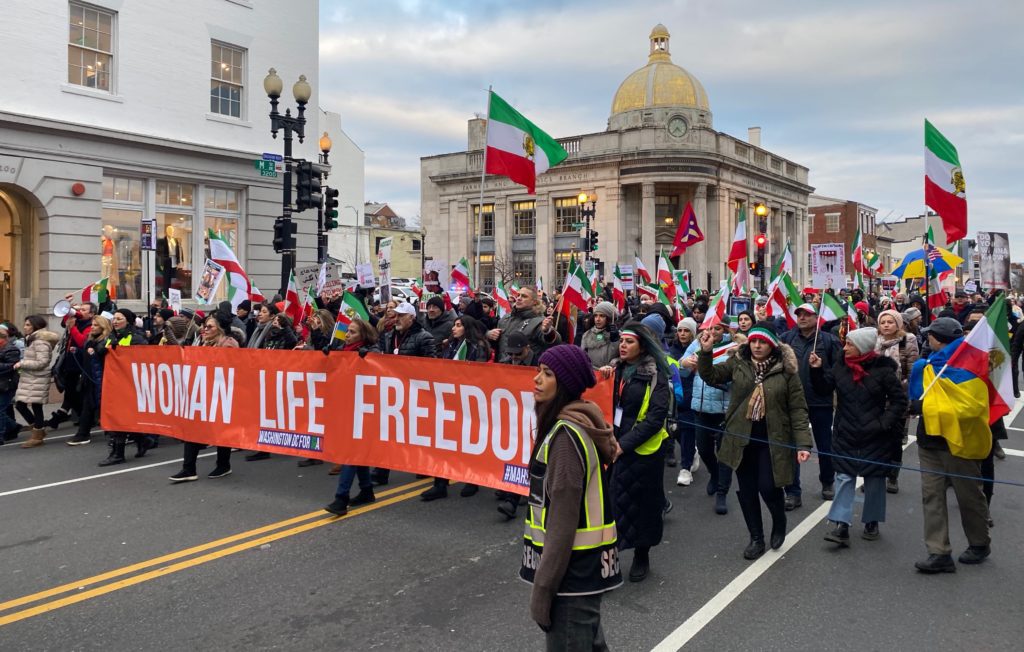
Saturday afternoon shoppers along Georgetown’s M Street seemed surprised as police shut down traffic to make way for a protest march of “between 500 to 1500” expected protesters (per a police press release) to the Ukrainian embassy at 3350 M Street NW. According to march organizers, however, nearly twice those estimated by police turned out, with over 2,800 activists participating.
Soon, a passionate and chanting crowd of pro-democracy activists calling for human rights in Iran and solidarity with the people of Ukraine in their defense against Russian invasion marched to the loud beat of drummers and loudspeaker amplification from Farragut Square downtown – where they held a 2:00 p.m. multimedia rally – to join supporters in front of the Ukrainian Embassy in the heart of Georgetown’s commercial district.
Organized by the National Solidarity Group of Iran (NSG Iran) in partnership with several local Ukrainian charities, protesters began their rally in the park at 912 17th Street NW on the blustery, cloudy afternoon under the motto and protest chant, “Woman, Life, Freedom!” The phrase took hold in Iran following the Sept. 16, 2022 arrest of a 22-year-old woman named Mahsa Amini who died following arrest by Iran’s Morality Policy for wearing her hijab “improperly.”
What began as a movement of girls and women in Iran calling for dress-code liberalization has grown in the last few months into a nascent revolutionary movement. Protesters in Iran and abroad now openly chant “Down with Khamenei,” Iran’s Supreme Leader since 1989, and “Down with the Islamic Republic,” radical political phrases that would earlier have been unthinkable under the deathly watch of Iran’s Islamic Revolutionary Guard Corps (IRGC).
Though many pro-democracy protesters outside of Iran fear the long reach of Iran’s intelligence services to disrupt anti-regime operations, Saturday’s marchers seemed unintimidated, selecting to march past the Delegation of the European Union at 2175 K Street NW in celebration of that body’s January 18 declaration that the IRGC is a “terrorist group.” As the movement has gained momentum, NSG Iran now holds weekly rallies and marches in the District.
The Georgetowner met with the organizer of the rally, Dr. Siamak Aram of NSG Iran as well as rally speaker Catherine Pedersen, of Ukrainian descent, and other rally participants. Each made it clear they believe the current movement in Iran differs from previous un-unified attempts to reform Iran’s Islamic regime and has shifted into a nationwide Iranian revolutionary movement for democracy, and that the peoples of Iran and Ukraine share their heroic fight for basic human rights.
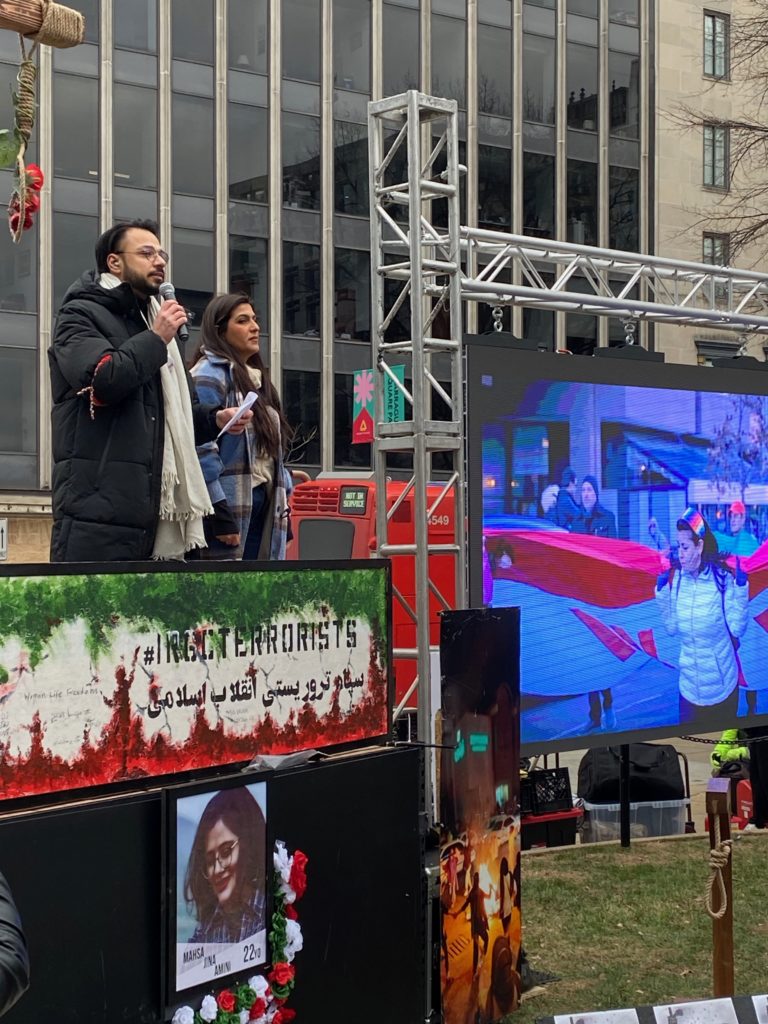
Dr. Siamak Aram of NSG Iran speaks at Farragut Square rally. Photo by Chris Jones.
“It’s been 18 weeks non-stop [to organize] for this event,” said Aram, a Harrisburg University professor who has taught Artificial Intelligence and Machine Learning at Georgetown University in the past. “Each week we try to design different routes,” with different themes to “make some [noise] to bring some attention and education to the community.” The group has marched with Afghanistan anti-Taliban protesters and others and have selected varying rally points and routes each Saturday. “We want to be the voices of the different peoples of these countries under their dictators,” Aram said.
“It’s the first time that a majority of the people in Iran don’t want this regime any more,” Aram continued. “They have tried different roads and approaches to reform the regime and try to make changes, but there was no success. But this time, everybody shouts that they don’t want this regime any more.”
“I was in Iran during the Green Movement” [in 2009], Aram recalled. “And I can feel and see that this time is totally different. At that time, the argument was over ‘where’s our vote? We want this president but not that one!’ But this time, we don’t want this regime at all, whether it’s this president or the other one…. We want freedom. We want democracy. And this regime is not able to bring peace and stability to the region [or] democracy and freedom inside the country.”
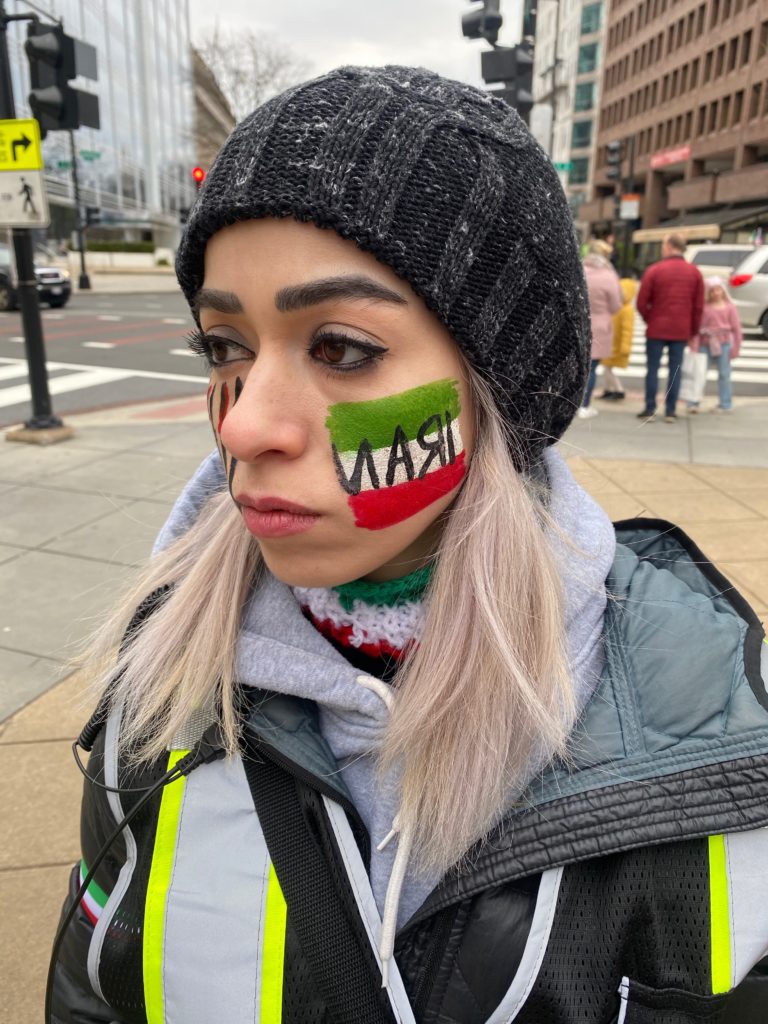
Security volunteer at Farragut Square rally. Photo by Chris Jones.
While the protests are difficult and time-consuming to organize, Aram is optimistic that the movement is building momentum from week to week, especially given the cold weather turnout on Saturday. He is disappointed, however, that words of encouragement have not been forthcoming from members of Congress, the White House and U.S. media, especially as so much attention has been given to the Ukrainian people’s struggles. But, Aram is especially thankful for the Metropolitan Police Department’s work to keep the weekly rallies safe. “They are very helpful and supportive,” he said, “and it’s not an easy job to do each week,” especially as each march’s logistics differ.
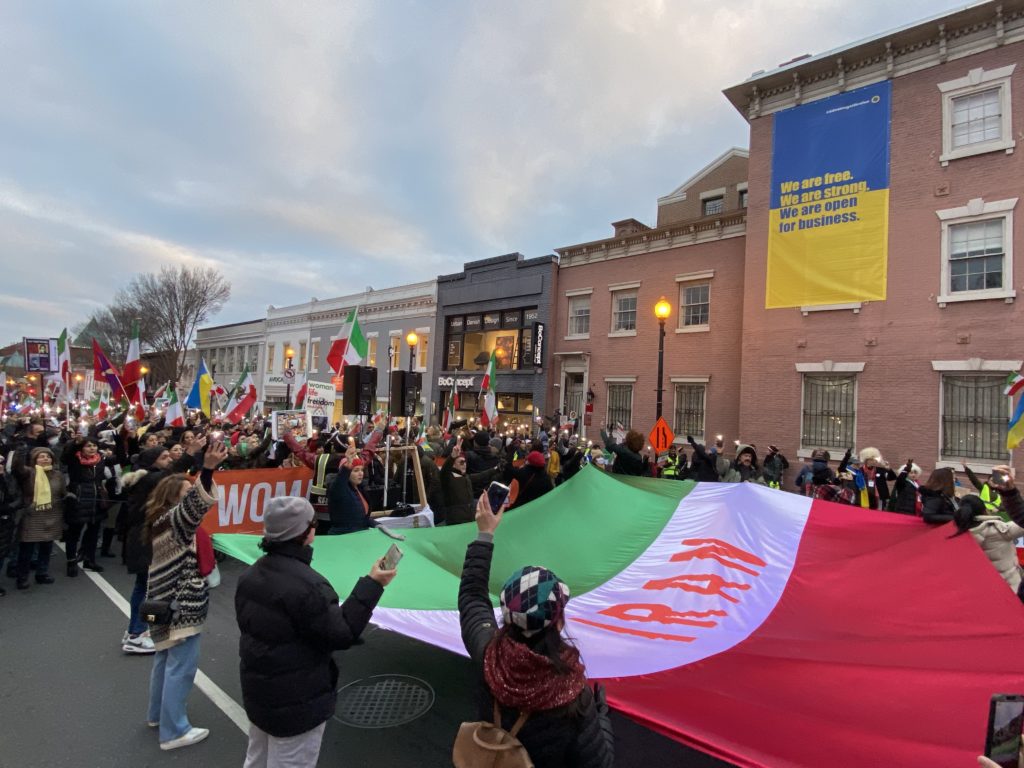
Iranian banner unveiled before the Ukrainian embassy in Georgetown. Photo by Chris Jones.
At the Farragut Square rally, Catherine Pedersen spoke powerfully from the perspective of her “Ukrainian quarter-Jewish heritage.” She told The Georgetowner her great grandmother managed to escape from Ukraine and Stalin’s genocidal forced famine policies just after the First World War and to emigrate to the United States at 12-years-old. As a board member of U.S.-Ukrainian Activists, Pedersen’s group had reached out with other Ukrainian protest groups to show solidarity with the “Women, Life, Freedom” movement and was invited to speak along with other Ukrainian activists.
Pedersen is especially concerned that the current geo-political and military alliance of Russia and Iran has become a major threat not only to the Middle East but to Europe. “Ukraine and Iran are very connected,” she said. “Mostly through their enemies, but also through their bravery and their drives for basic rights and for freedoms….Today, we see this alliance reach a place where Iranian weapons are attacking Europe. We ignored the Iranian regime and the way it has undermined nations and democracies in the region and across the world. Because we thought it wouldn’t touch us in America or Europe. We were wrong. It’s time we all woke up to the fact that every time there’s a regime somewhere in the world that’s oppressing its people, taking away their basic human rights, committing atrocities, sooner or later, even we comfortable people will suffer.”
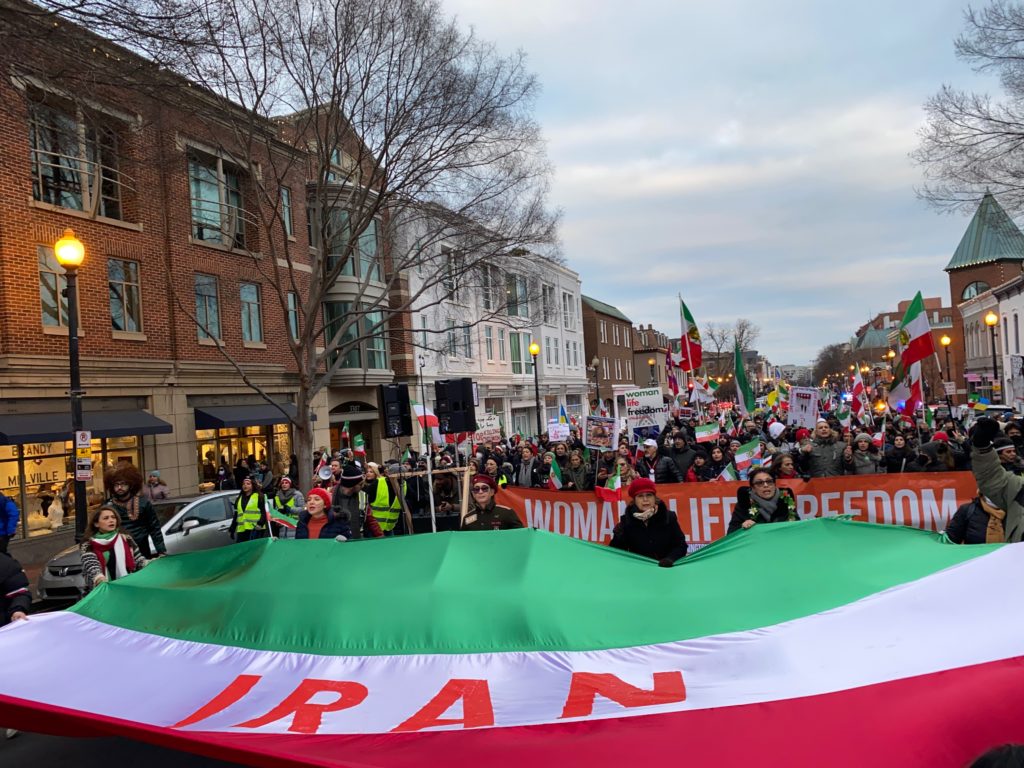
Photo by Chris Jones.
“Sooner or later we will be in danger because of the impunity we allowed to grow over the years,” Pedersen continued. “We were silent when Russia flattened Chechnya, when they invaded Georgia. We were silent when Iran and their puppet organization, Hezbollah, and the Assad regime committed unspeakable atrocities and mass murder in Syria for over a decade now. And this same alliance between Iran and Russia that has led to so many murders and so many deaths in Syria – we see that same alliance causing murder and death in Ukraine. If Ukrainians had not stood up and stopped the Russian invasion and held the line against the Russian invasion of Europe we would see a Russian-Iranian military alliance in Moldova, maybe Poland. We need to wake up. I think many of us have woken up.”
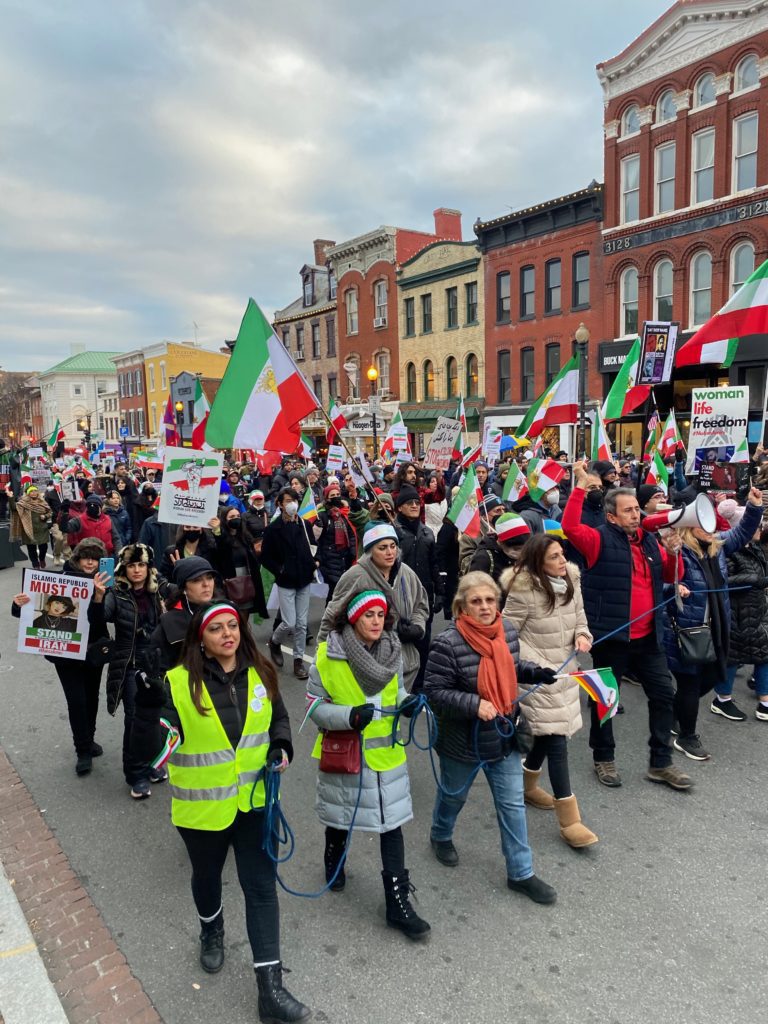
Protesters approaching the Ukrainian embassy on M Street. Photo by Chris Jones.
Working security for the march, young Iranian-American woman Mona Shah (one of the few protesters willing to reveal her full name), said, “We’re trying to be the voice of the people of Iran. You know, the government there is cutting off the people’s voice. They’re doing terrible things and then denying it…. This is about human rights. This is about something that before I was even born, started in Iran, and they’ve been killing all these years and it never went anywhere. But this year is different.”

